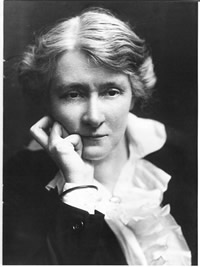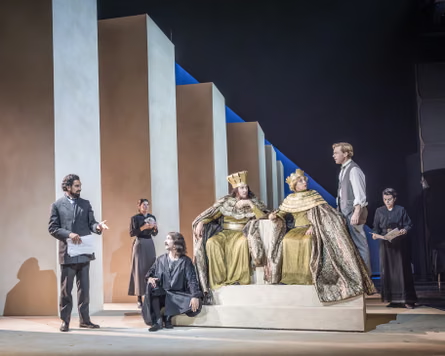Grace Pervades in Bath with David Hare's latest play
- GutBer English

- Jul 7, 2025
- 7 min read

“Whether in movement or repose, grace pervades the hussy”, Charles Reade
The English theatre stages of the late 19th century were dominated by the productions of London's Lyceum Theatre, managed by Henry Irving, whose statue stands between the National Portrait Gallery and the Garrick Theatre as the first actor in history to be knighted. His influence in the history of theatre would not have been the same without the essential presence of the first lady of the stage at the time, Ellen Terry (great-aunt of Sir John Gielgud, another theatrical giant, this time of the 20th century). Ellen's sons, Teddy and Eddie, would revolutionize theatrical form at the beginning of the 20th century. Without them, theatre as we know it today would not have come to be.
Based on Michael Holroyd's biography of this talented family, A Strange Eventful History: The Dramatic Lives of Ellen Terry, Henry Irving and Their Remarkable Families, David Hare presented his latest play, Grace Pervades, at the Theatre Royal, Bath from June 27 to July 19, 2025, before moving on to London's West End in 2026. This play, in which the actor plays the illustrious and complex Henry Irving, kicks off the Ralph Fiennes Season in Bath, which runs until mid-October and also includes musical performances by Patti Smith and Kae Tempest, as well as a revival of As You Like It and the world premiere of Rebecca Lenkiewicz's latest play, Small Hotel.

The biography on which the play is based is extensive and includes all sorts of details. We were especially curious as to how Hare managed to convey all this information and the biographies of the four central characters, covering practically a century of theatrical history, in a two-hour play. Although critics insist on pointing out that Hare was overly ambitious and that, in trying to cover so much, he remained superficial and lacked cohesion, we must disagree. Yes, you can't expect everything to be there, but funnily enough, most of it seems to be.

The characters of Ellen Terry's children act as narrators, speaking directly to the audience from the edge of the stage. While providing context for their mother’s and Irving's story, they also reveal their own personalities and concerns. Thus, we can follow the two periods in parallel. Jordan Metcalfe presents us with a self-absorbed, narcissistic Edward Gordon Craig, who eventually becomes involved in theatrical artistic design and creates his own manifesto. We see his attitude to life and work portrayed in his scene with Isadora Duncan (played by Saskia Strallen) or with Stanislavski (Guy Paul) in Russia, where he declares his personal vision of the theater of the future. Ruby Ashbourne Serkis, in her brilliant theatrical debut and whom we have recently seen on TV in I, Jack Wright, shows total command of the stage giving us a young and revolutionary Edith Craig who lives with her mother in her house in Kent, where we see her build her small theatre where she performs more than one hundred plays about social issues in the company of her two main collaborators, also her partners. Thus, while we are told about the actors of the previous generation (Terry and Irving), the young ones also lead us through their own experiences.
Ellen Terry (Miranda Raison) and Henry Irving (Ralph Fiennes) don't speak directly to the audience, maybe to compensate for Irving’s tendency to speak to no one else. They are characters in a play, who are also actors and appear in the role of other characters, but their dialogue also addresses the problems of Ellen's children while also detailing their own development on stage or the ups and downs of their personal relationship, also mentioning social issues of the time. This way, in a double act, each pair advances the action of the other, condensing the biographies of all four into two splendid hours.

There's no shortage of references to the social restrictions of each pair's time: Ellen having two children out of wedlock, the public image of actresses as people of low morals, women in the shade of men or Eddy's commune lifestyle. There are also plenty of details about each of their lives and their parallels with the evolution of theatre, greatly aided by stage design and characterization.

Metatheatre being at the centre of the play, the stage itself seems like a backstage area, where from the beginning we see the machinery and various fabric-covered furniture, set aside in corners, waiting to be used in one scene or another. At one point, we can even see Ralph Fiennes/Henry Irving changing costumes on one side. We are seeing the theater's interiors on the stage itself as part of the play; after all, this is the recent history of English, and practically world, theatre. We go from classical sets and costumes when Terry and Irving perform Hamlet, Macbeth, or The Bells to rural gardens where Eddy shares his mother's final days or the grandiose creations of Teddy's plays in Russia. The first time we see Fiennes on stage, with the entire company surrounded by mist, and he approaches center stage to begin the action, we think we're seeing Irving himself in the flesh. The green dress Miranda Raison wears in the scene from Lady Macbeth is perfectly recognizable from the famous painting, and the sweetness she conveys brings back an Ellen Terry whose grace can't help but stay with us. But there are also jokes and winks at the viewer.

The different tours in America, the unsimilar personalities and aspirations of Ellen and Henry, their getting closer and their distancing, how they both need each other and make each other better, how Henry climbed to the heights of society to be knighted at a time when it was not something likely for an actor, but he was not just any actor, he was also an entrepreneur who raised the Lyceum to the highest level of society in his time, ... All this is tackled in the play. But also is his intransigence and his limitations as an actor or his shortsightedness regarding the variety of plays to perform, how he settled into his comfort zone refusing to produce works by Shaw or Ibsen, which were in vogue at that time, how he did not dare to try on more creative roles, how he limited Ellen's own options, without which he would never have achieved his dreams. And also how she gives, generates and helps build a world in which she is not allowed to participate fully. She never got to play Beatrice, despite Irving's constant promises, because he couldn't produce a play in which he wasn't the star. Ah, the fragile male ego.

And that is the question Hare asks us with his play: who was happier? Was it Henry, meeting and far exceeding all his expectations, or Helen, being part of that world and facilitating its existence even though she couldn’t do what she would have liked? Was Teddy more fulfilled by not producing a single play, but creating an essential breeding ground for the theatre of the future and working with the greats of the moment, or Eddy producing hundreds of small plays on social issues on a very small budget in a small cottage in Kent? The title itself seems to say it, Grace Pervades, what prevails is the grace, Ellen’s generosity, happy in her retirement knowing that she contributed behind the scenes to create a world that would not exist without her.

The phrase is taken from a comment by Charles Reade about Ellen during her time: “grace pervades the hussy,” a direct reference to Ellen's dissolute life, ignoring all the social conventions of her time, openly bearing children out of wedlock or allegedly having a relationship with Irving, who was a married man. The most idolized, idealized, and desired woman of late 19th-century England is also the one who created the figure of Irving and his children. She should have a statue in front of the National Portrait Gallery, perhaps next to Irving, or Irving next to her, but it seems that the present, more than a hundred years later, has still not been able to recognize her. What remains is what emerged from her; her grace pervades.

We attended the first two performances of the world premiere of David Hare's play Grace Pervades with Ralph Fiennes and Miranda Raison on Friday 27 and Saturday 28 June 2025 at 7:30 pm at the Theatre Royal Bath. Among those in attendance were the artistic and creative team led by David Hare (writer) and Jeremy Herrin (director), as well as well-known actors such as Edward Norton, Indira Varma, Dame Harriet Walter or Tom Hollander.
Grace Pervades can be seen at the Theatre Royal Haymarket in London from April 24 to July 11, 2026. Tickets can be purchased on the theatre's website from September 26, 2025, starting at £25.

Cast

GutBer English is an English school in the centre of A Coruña with over 20 years of experience in the city and several generations of students who have left our classrooms mastering the English language and certifying their level with an official diploma that has opened the doors to the world of work and education. Join our English groups for preschool and primary school, secondary school, high school, or adults, or participate in our online courses in Legal English for TOLES and English Syntax for university students.








































Comments